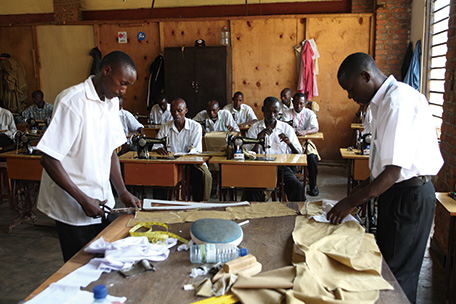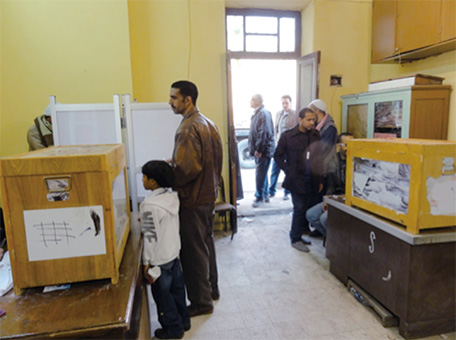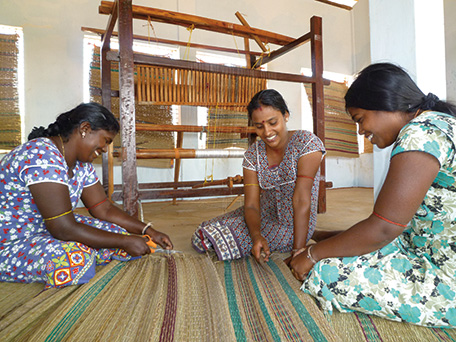Japan's Official Development Assistance White Paper 2012
4. Peacebuilding
Regional and internal conflicts arising from ethnic, religious, and historical differences continue to pose problems for the international community. Such conflicts generate a great number of refugees and internally displaced persons (IDPs), and lead to humanitarian issues and violations of human rights. Furthermore, they also destroy achievements made through many years of developmental efforts, and cause massive economic losses. For these reasons, engagement in "peacebuilding" is the challenge for the entire international community, which could build a foundation for development to prevent conflict or its recurrence and to consolidate sustainable peace. For example, discussions on consistent approach of development support from the resolution of conflicts, recovery, and reconstruction to nation-building are ongoing at forums such as the UN Peacebuilding Commission established in 2005.
<Japan's Efforts>
Japan provides support that includes assistance for refugees and food assistance under armed conflict, and electoral assistance for the peace (political) process. After the resolution of conflicts, Japan assists in the disarmament, demobilization, and reintegration (DDR) of former soldiers to ensure the consolidation of peace. It also provides support to rebuild the security sector and ensure domestic security and stability. In addition, Japan supports the reconstruction of affected countries by working to repatriate and resettle refugees and IDPs, and to rebuild the basic infrastructure. Further, in order to consolidate sustainable peace and prevent the rise of another conflict, efforts are made in social sectors such as healthcare and education as well as strengthening governmental, judicial, and police functions, and supporting the development of economic infrastructure and institutions. Japan combines bilateral aid through international organizations and bilateral aid, including grant aid, technical cooperation, and ODA loans to provide such aid in a seamless manner.

JICA Skills Training for the Reintegration of Demobilised Soldiers with Disabilities project in Rwanda. (Photo: Atsushi shibuya)

●Egypt
Assistance for Creating a New Government in Egypt
Election Assistance
Egypt faced the challenge of creating a new government after the end of the 30-year Mubarak regime through 'Arab Spring'. The political process to create a new assembly, president and constitution has begun. 'Elections' were critical to find out whether or not "Arab Spring" truly represents a new beginning.
Since Japan received a request for supporting election from the post-Mubarak Egyptian government in February 2011, Japan dispatched election support experts to Egypt the following month. Then, in July, Japan hosted a local seminar in Cairo, and Japanese experts explained the election system and the use of political funding to the election commission and other relevant agencies to strengthen the election preparation system. In October, shortly before the election day, Japan hosted a seminar on journalism for democratic elections for members of the media at a state-owned broadcasting station in Egypt. Japan also provided the election commission with equipment for a newly established media center and other facilities. This promoted the distribution of information to voters for the new election, and contributed to raise the voter turnout rate and reduce the number of invalid ballots.
Japan has its own knowledge and experience for supporting elections, such as 'respecting the autonomy of the country' and 'supporting the media to hold a neutral and fair election'. This know-how is fully utilized in assisting Egypt. Japan's support for election is expected to expand to support for the newly inaugurated parliament and for the permanent central and local election commissions.

A polling place for the election to the People's Assembly. (Photo: Yasuyuki Matsuda / Embassy of Japan in Egypt)
●Sri Lanka
Project for Development Planning for the Urgent Rehabilitation of the Resettlement Community in Mannar District
Technical Cooperation through JICA's Loan Account - Project in relation to ODA Loan
(Project for Development Study) (March 2010 - July 2012)
As the 26-year conflict between the Sri Lankan government forces and the Liberation Tigers of Tamil Eelam (LTTE) ended in 2009, approximately 280,000 internally displaced persons (IDPs) have returned to their hometowns mainly in the north, where much of the fighting took place. By July 2012, around 92,000 IDPs had returned to Mannar District with harsh natural environment and high poverty rate. However, it is difficult for re-settled IDPs to rehabilitate their livelihoods, because Mannar District was an undeveloped area in the country, and homes, public facilities, and agricultural and fishery facilities were destroyed in battle.
In light of these circumstances, Japan is helping re-settled IDPs in the 24 communities of the 11 villages of Mannar District by providing comprehensive support from rebuilding the local infrastructure to securing livelihoods and strengthening community organizations. Japan has supported a total of 7,640 people by rehabilitating water supply facilities, rebuilding community centers, building hatcheries for local chicken, providing machinery and equipment for straw mat weaving and bakery, and conducting accounting management training for fishery unions. Japan has also developed a comprehensive development plan to resume the socio-economic activities throughout Mannar District, with utilizing the knowledge and experience in rehabilitating livelihoods gained through community-based activities. Eventually, Sri Lanka would be able to rebuild and develop the entire district of Mannar, where most of the people are resettled-IDPs, by themselves, based on the above-mentioned plan.

Straw mat weaving facilities helped people make a living before the conflict. Japan rehabilitated them and provided looms. (Photo: JICA)
●Human Resources Development for Peacebuilding
Requirements in the fields of peacebuilding are becoming more diverse and more complex. In response to these needs on the ground, Japan has conducted the Program for Human Resource Development in Asia for Peacebuilding since FY2007 to develop civilian experts from Japan and other Asian countries who will be capable of playing an active role in this field. Pillars of the program consists of coursework in Japan, where Program Associates acquire the practical knowledge and skills required at the peacebuilding field, overseas attachment, where Program Associates engage in actual work at local offices of international organizations at the peacebuilding field, and support for graduates to build their careers. To date, 185 Japanese and other Asians have participated in the training courses. Many Program Associates are now actively working in the field of peacebuilding such as in South Sudan, Sierra Leone and Afghanistan.
